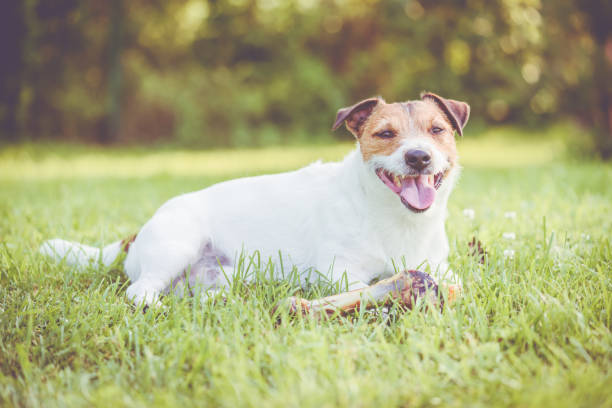It’s widely understood that peanut butter is a food specifically designed for human intake, not for animal use. Nonetheless, some pet owners continue to administer it to their dogs under the false impression that it could enhance their pet’s health or possibly increase its longevity. Sadly, this belief is not rooted in truth.
Peanut butter can be very toxic to your dog. Some common symptoms of digesting too much of this nutty goodness include vomiting, diarrhoea, lethargy, and even seizures in severe cases. The bottom line? Never give your dog any nut product, no matter how much you want them to love it.
So, is peanut butter bad for dogs?
The short answer: yes. But despite the dire warnings above, it’s not as black and white as it may seem. The keyword in this article is moderation. It would help if you never fed your dog large quantities of peanut butter at once because there could be adverse health effects, but a little bit now and then is generally safe.
In terms of the health effects, here are some things to think about:
- The majority of nuts, including peanuts, contain high fats that can cause pancreatitis in dogs. This means that it’s best to avoid feeding your dog anything with nuts or nut products.
- The sugar in peanut butter can also be a problem for dogs, mainly if not properly digested. In some cases, the sugar levels found in it cause obesity and tooth decay. However, this is not true of all types of peanut butter, so be sure to read the labels closely before feeding your dog any peanut butter.
- The high salt levels found in many peanut butters can also be dangerous for dogs, causing them to drink too little or too much (generally the latter). Your dog must maintain a steady amount of water intake because severe kidney problems may arise if they do not. If you are concerned about your dog’s salt intake, it may be best to avoid feeding them peanut butter.
- Lastly, and most importantly, peanuts contain a specific acid that can cause dogs severe respiratory and skin problems. This substance makes many people believe that nuts are bad for dogs because they are naturally found in the nut itself. The severity of these side effects depends on how much your dog eats because the more they have, the worse it will be. This is especially true if you feed your dog raw or roasted peanuts instead of boiled or honey roasted.


Common Symptoms of Digesting too much Peanut Butter
Many people believe that peanut butter is toxic for dogs. It’s best to know what is true and what isn’t when it comes to your pet, so here are the facts you need to know about this common misconception. You will learn why it is not just safe but beneficial for your dog to eat peanut butter!
Here are the common symptoms of overeating peanut butter:
- Vomiting
- Diarrhoea
- Cramps or stomach aches
- Nosebleed (possibly)
- Allergic reaction (difficulty breathing, hives, swelling of the tongue or face, etc.)
However, there are many other more severe symptoms you should be aware of as well:
- Stroke
- Coma
None of these is likely unless your pet eats a considerable amount of peanut butter, but it’s good to be aware, so you can respond appropriately if the situation arises.
In general, it’s best to be safe when giving your dog peanut butter.


You can always give your pet a taste of peanut butter occasionally without any problems, but if you want to feed them the spread more regularly, there are some things you should do first:
- Make sure your dog has no prior adverse reactions to peanuts.
- Mix it with something else, like pumpkin or other health supplements. This should help your pet eat the peanut butter more easily if they are not used to it.
- Monitor your dog during feeding time so you can react quickly should anything go wrong.
If you want to feed your dog peanut butter occasionally without giving them an entire jar, stick to the serving size listed below based on your dog’s weight.
That way, you can be sure that they are getting just enough to taste it without the risk of their overeating.
- Under 10 lbs., 1 tsp.
- 10 – 25 lbs., 2 tsp.
- 26 – 50 lbs., ¼ cup
- 50 – 75 lbs., ½ cup
- Over 75 lbs., ¾ cup
Peanut butter is perfectly safe and healthy for your dog to eat. However, as with any other new food you introduce to your pet, it’s essential to monitor their reaction and ensure they don’t have a negative one. You should also be aware of the symptoms mentioned above. If your dog does not have an adverse reaction to peanut butter, they can enjoy it more regularly without any problems.


Conclusion
In conclusion, it’s best to always consult a veterinarian before feeding peanut butter to your dog if any allergies or sensitivities your dog may have. Also, it’s a good idea to ask them whether peanuts should only be given as a treat because their high-fat content can turn into junk food for dogs if eaten in excess.
Beyond the peanut butter debate, you should always consult with your vet before feeding your pet any new food to ensure no allergies or sensitivities they may have. And even if your vet says it’s safe, provide peanut butter in moderation because, again, it is not just toxic for dogs but also fattening.


